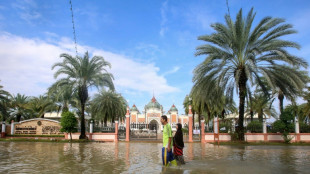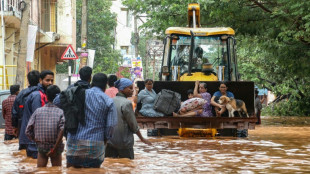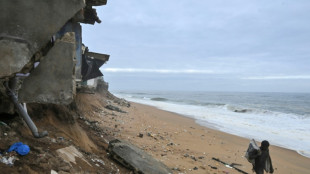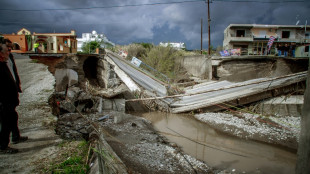Hurricane Milton roars towards storm-battered Florida
Hurricane Milton barreled towards Florida as a weakened but still major Category 4 storm on Tuesday, threatening the US state with a second ferocious hurricane in as many weeks.
Forecast to batter Mexico's Yucatan peninsula as it churns eastward, Milton triggered evacuation orders and warnings of savage conditions on Florida's west coast.
"If the storm stays on the current track, it will be the worst storm to impact (Florida's) Tampa area in over 100 years," the National Weather Service said.
The storm's maximum sustained winds were near 155 miles (250 kilometers) per hour, it said -- weakening slightly from earlier in the day to a Category 4, the second highest on the scale.
Communities hit by the deadly Hurricane Helene, which slammed Florida late last month, raced to remove debris that could become dangerous projectiles as Milton approaches.
"All this stuff is just wind fodder that's going to just be blowing down the street and hitting who knows what," said David Levitsky, a retired homeowner on Treasure Island, in Pinellas County.
Residents on the low-lying island have been piling up debris from Helene's flooding in their front yards for removal.
The back-to-back hurricanes have ignited political bickering ahead of the upcoming US election.
Governor Ron DeSantis DeSantis, a conservative known to clash with the federal government, came under fire after broadcaster NBC reported he was ignoring phone calls from Vice President Kamala Harris on the Helene recovery.
DeSantis did speak to President Joe Biden about the Milton preparations, the White House said late Monday.
Harris slammed the Republican governor for "playing political games."
"It is about political gamesmanship, instead of doing the job you took an oath to do, which is to put the people first," she told reporters, while also criticizing Trump as "extraordinarily irresponsible."
Former president Donald Trump has tapped into real frustration about the federal response after Helene and fueled it with disinformation, falsely claiming federal disaster money had been spent instead on migrants.
Researchers say climate change likely plays a role in the rapid intensification of hurricanes, because there is more energy in warmer oceans for them to feed on.
- Worst hit in 100 years -
Florida authorities have issued mandatory evacuation orders for areas including some parts of Tampa, a metropolitan area of more than three million people that could take a direct hit.
A major storm surge for Florida's west coast is forecast for Tuesday night or early Wednesday, and Tampa could suffer an influx of water up to 15 feet (4.5 meters) above ground.
Rainfall of up to 15 inches (38 centimeters) is expected to cause severe flash flooding.
In the central city of Orlando, under gray skies, hundreds of cars lined up to collect sandbags.
"We might evacuate, me and my pets, we might go to Georgia," Tony Carlson, 32, told AFP. "People think it's going to be pretty bad."
Maria Torres, 29, said her family was not planning to leave, but had prepared with a generator, food and water.
The Disney World theme park said on its website that it would remain open Tuesday, though a few resort areas were closing ahead of the storm.
In Tampa, zookeepers rushed to get the animals -- from porcupines to elephants -- inside protected areas.
In Mexico's Yucatan, workers boarded up glass doors and windows, fishermen hauled boats ashore and schools were suspended.
In the southeastern United States, emergency workers are still struggling to provide relief in the aftermath of Helene, which killed at least 230 people across several states.
Helene hit the Florida coastline on September 26 as a major Category 4 hurricane, causing massive flooding in remote inland towns in states further north, including North Carolina and Tennessee.
Helene was the deadliest natural disaster to hit the US mainland since 2005's Hurricane Katrina, with the death toll still rising.
(C.Fontaine--LPdF)




